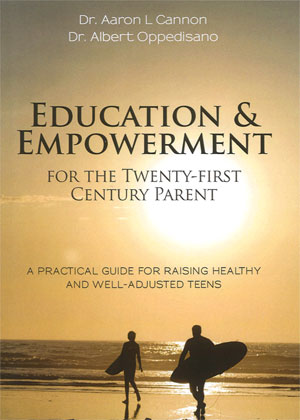Trouble with Your Teen?
By: Other | June 27, 2013

Written by Rebecca Zygar
Parenting can be the most rewarding experience. However, it can also be very difficult, especially through the teen years and specifically in these modern times. It is important to develop and maintain strong bonds within the family. Teens need to know that their parents can handle their issues, however complicated they may be. They look to their parents for guidance and need effective parenting and healthy boundaries.
In their book, Education & Empowerment for the Twenty-First Century Parent, Drs Cannon and Oppedisano utilize personal experience and professional expertise to provide a practical guide for parents, emphasizing consistency and effective communication. Their ideas are clear, realistic, practical and powerful, bringing confidence and skill to your dealings with your children. They guide parents on how to approach young people in positive constructive ways when dealing with the dynamics and intricacies of raising adolescents. The following are excerpts of key items that the authors address.
Areas of Focus to Effectively Parent your Teen:
Effective Communication:
Communication, trust, and strong familial bonds are at the core of a healthy, functional family. Parents need to learn how to listen to their children. Use active listening skills to uncover the actual emotional content of the exchange. Ask open-ended questions to encourage a more engaged conversation. Implement paraphrasing to avoid misinterpretation of what your children are telling you. Use “I” statements to own your own emotions and model to your children the right way to take personal responsibility. Avoid lecturing, arguing, and yelling. Consistency is key. Children need to know what is expected of them. (p. 24-26)
Discipline and Cooperative Problem Solving:
To discipline effectively, parents must communicate effectively. When disciplining inappropriate behavior, rules, expectations, and dialogue must be used. Parents should ask themselves, “What am I teaching?” and “What message am I sending?” to their children. Discipline is linked directly with teaching versus punishment. Role modeling plays a key role in parenting. Using rigid problem-solving skills is ineffective. Cooperative decision-making allows the family to examine problems together. Model how people learn from their mistakes to your teens. (p. 42-45)
Cyberbullying/Internet Safety/Avoiding Victimization & Sexualized Violence:
As a family unit, an open and honest discussion regarding the Internet and social networking needs to occur, and rules and boundaries need to be clearly established. It is important for parents to educate your kids about the online tactics that predators use. Internet safety comes back to the communication strategies that define your relationship with your teen. Developing approaches that focus on safety and deterring victimization should be a crucial part of any parents assessment of risk and intelligence gathering.
Home Safety:
Safety must be approached from all angles. Develop a safety plan as a family. Do not forget logical ideas like making sure all doors and windows are locked. Establish rules regarding the manner your child answers the door. Teach your children to run if confronted by a large adult and to fight back if grabbed.
Sex and the Modern Teen:
The risks associated with teen sex are real and can be life altering. Prior to any conversation with your teen, it is important to have a well-defined position regarding his or her potential sexual activity. Role-playing with a trusted person can help you define the particular way in which you want to approach this sensitive topic. Help your child develop a positive self-image and strong self-esteem. (p.115-116)
Understanding Signs and Symptoms of Mental Illness and Drug Abuse:
Helping your child to develop insight into the importance of healthy decision-making is crucial. The adolescent brain is geared toward impaired decision making. Because the teenage brain is more susceptible to addiction, helping your child manage this precarious time is absolutely crucial. An aspect of teens’ susceptibility to addiction is influenced by limited coping skills. Numerous studies have shown that an active parenting style decreases the likelihood that your child will abuse drugs and alcohol.
During any stage of development, it is normal for children to express a wide range of emotions. Understanding the signs and symptoms of mental illness or mood disturbances is important and relevant because it can help you distinguish between behaviors that are a normal part of adolescent development and those that are of greater concern.
For more information and resources on effective parenting for your teens, please visit: http://www.amazon.com/Education-Empowerment-Twenty-first-Century-Parent/dp/1478129921/ref=sr_1_1?ie=UTF8&qid=1371954656&sr=8-1&keywords=education+%26+empowerment+cannon
The guidance and support of a therapist can be helpful to effectively implement the strategies described above. Your therapist will take all family members views into consideration and facilitate a productive and respectful conversation. Click here to learn more about Family Therapy or Child / Teen Therapy at Therapy Changes.
Reference:
Cannon, A. L., & Oppedisano, A. (2013). Education & empowerment for the twenty-first century parent . San Diego, CA: printed by CreateSpace.



